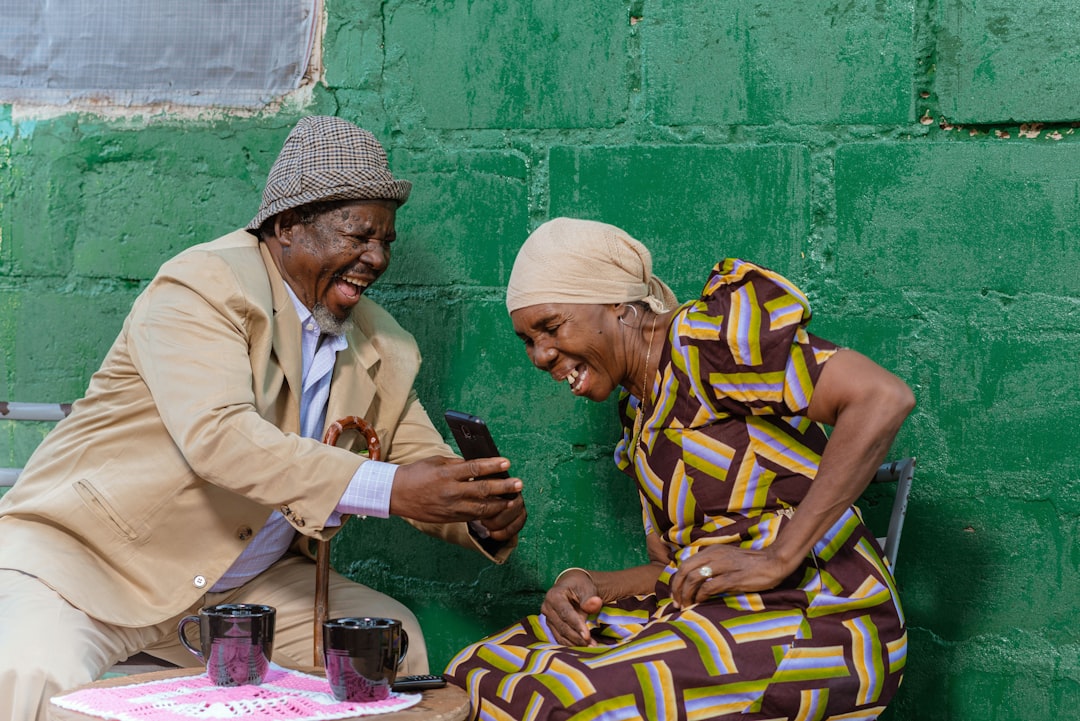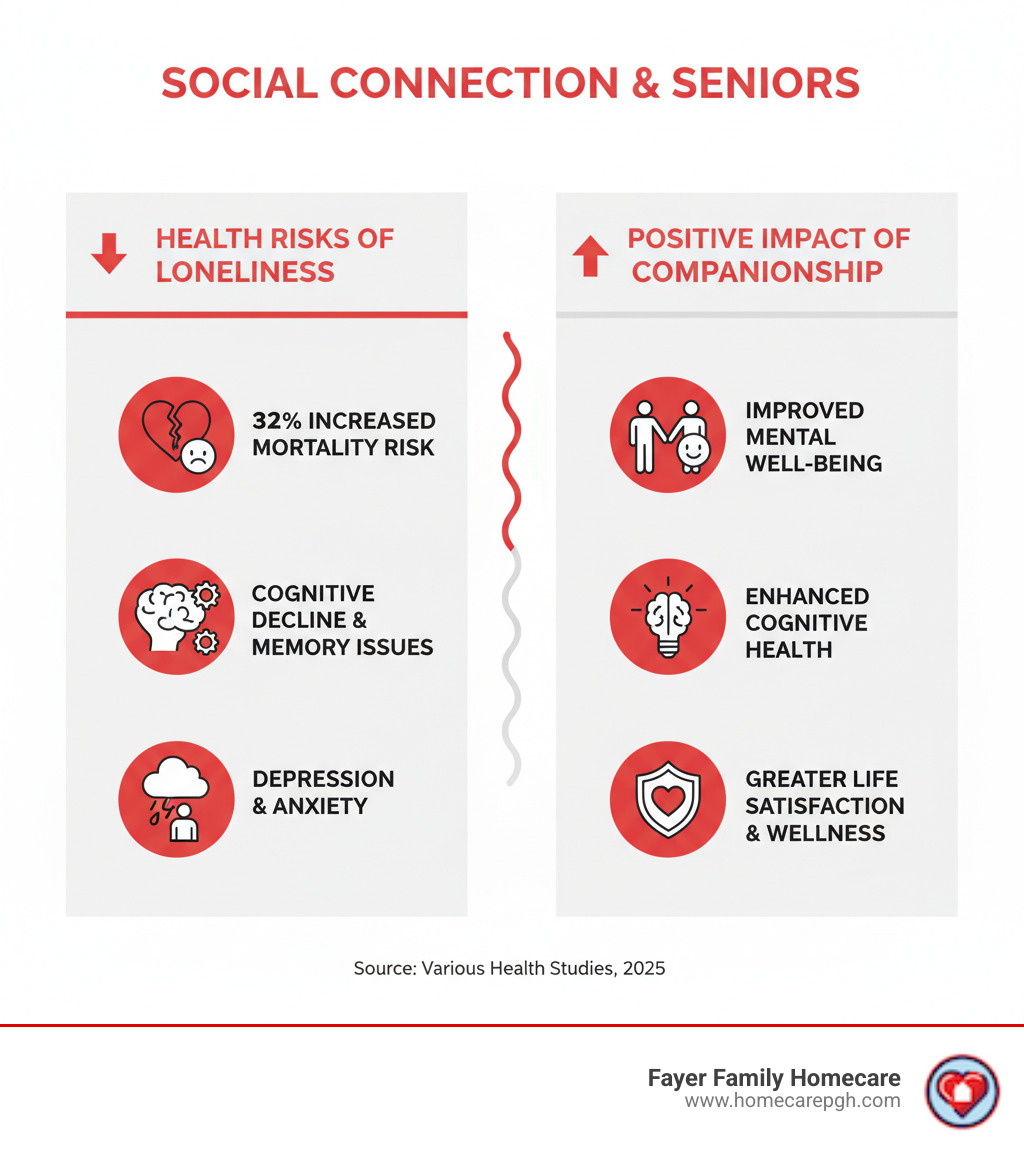
May 29, 2025
The Essential Guide to Home Care Services for SeniorsDiscover care in the home services for seniors—compare costs, types, and tips to choose the right home care for your loved one.
Read Article
For many families, ensuring their aging loved ones feel connected is a top priority. This is where volunteer companionship for the elderly offers a powerful solution to combat loneliness and bring joy to seniors' lives.
Social isolation is a silent health crisis. As seniors age, their social circles often shrink due to friends passing away, family living far, or mobility issues. This loneliness poses a real health risk, with studies showing that social isolation can increase the risk of early mortality by as much as 32 percent. It also contributes to faster cognitive decline, depression, and anxiety.
The good news is that regular social engagement can dramatically improve these outcomes. Companionship helps reduce social isolation, boost mental and cognitive health, improve physical well-being, and increase overall life satisfaction, helping seniors maintain their independence for longer.

At its heart, volunteer companionship for the elderly provides social connection and emotional support to seniors who feel isolated. Volunteers offer their time and friendship through friendly visits, conversation, and shared activities. This is a non-medical role focused purely on fostering social interaction. Volunteers do not perform medical tasks or personal care; their primary goal is to build a friendship and reduce feelings of loneliness.
For more information on the types of support we can offer, please visit our Companionship Services page.
The impact of volunteer companionship profoundly improves a senior's quality of life.
These benefits underscore why investing in social connection is crucial for our loved ones. You can read more about the Scientific research on social contact and cognitive health and its importance.
The magic of volunteer companionship for the elderly lies in the simple moments shared. These activities create lasting bonds and can be custom to each senior's interests and abilities. What matters most is the connection it fosters.
Meaningful connections often happen in the comfort of a senior's home with gentle activities that require no special equipment.
These activities build the trust and familiarity needed for a meaningful friendship. You can learn more about developing these connections in our guide on being a companion to the elderly.
Creative projects allow seniors to express themselves and provide a sense of accomplishment.
Here are some simple craft ideas perfect for volunteer visits:
Getting out of the house, even briefly, can dramatically improve a senior's mood and sense of connection.
These outings help seniors feel less isolated and more like active participants in their neighborhoods. Learn more about supporting independence through our insights on senior home companions.
Volunteer companionship for the elderly can be adapted for unique circumstances to ensure even the most vulnerable seniors receive connection.
For families caring for loved ones with dementia, specialized companionship is crucial. Volunteers receive extra training to support seniors with cognitive challenges. Find how we approach this specialized care through our dementia companionship care services.
Becoming a volunteer companion is a rewarding journey that enriches your life while making a real difference in a senior's.
Volunteering isn't just about giving; the rewards are significant. You'll find a profound sense of purpose, and research shows that your happiness increases by 7-16% through volunteering. You get to share your skills and learn from the wisdom and life lessons of seniors, often forming connections that feel like family. It's a powerful way to strengthen your community by caring for its members.
Reputable organizations guide you through every step to ensure a safe and successful experience for everyone.
The process typically begins with volunteer screening, including an application, interviews, and background checks to build trust. You'll then receive training on effective communication, activity ideas, and understanding the challenges of social isolation.
The time commitment is manageable, usually one to two hours per week. Consistency is key, so most programs ask for a minimum of one year to allow a real friendship to develop. Programs like AmeriCorps Seniors may ask for more time but also provide additional structure. Organizations follow standards like the Canadian Code for Volunteer Involvement, ensuring you are treated with respect in a well-supported role.
Finding the right volunteer companionship for the elderly opportunity is easier than you might think.
The goal is to find the right fit for both you and the senior. If you're in the Greater Pittsburgh Area, you can start by learning more about finding a companion for the elderly near me.
For families considering volunteer companionship for the elderly, it's natural to have questions about how these programs work. Understanding the practical aspects is key to finding the right fit.
Volunteer companionship programs are designed to be as inclusive as possible. They generally serve seniors who are socially isolated, homebound, have limited mobility, or are living with disabilities. The goal is to reach those who would benefit most from a friendly visitor.
A major advantage of volunteer-based programs is that they are often free or very low-cost for seniors. They are funded by grants, donations, and the generosity of volunteers, removing financial barriers to accessing companionship.
While services are free to seniors, programs have real operational costs for volunteer screening, training, and coordination. Financial donations from families who are able to contribute are vital for sustaining these services for others in the community.
For a deeper dive into the financial aspects of senior care, including volunteer options, you can read our article on More info on senior companion care costs.
The success of volunteer companionship for the elderly relies on broad community support.
Financial contributions from organizations and corporations are vital. These donations fund volunteer recruitment, background checks, training, and program coordination, ensuring high-quality, safe companionship for seniors.
Many companies also encourage corporate volunteering, allowing employees to dedicate work hours to community service. This is a wonderful way for businesses to give back while employees build teamwork and social responsibility. Corporations can also sponsor companionship programs or events, allowing these initiatives to expand their reach and offer more engaging activities.
Finally, government funding through national programs like AmeriCorps Seniors provides essential support to local organizations. This helps them run initiatives like the Senior Companion Program, reaching a broad number of seniors across the country. It’s a collective effort that builds a more compassionate society for our older adults.
We understand that families have specific questions when considering volunteer companionship for the elderly. Here are answers to some common concerns.
This is a crucial distinction. Their roles are quite different, even though both care deeply about seniors.
Volunteers cannot perform medical tasks or personal care. Their role is strictly social and emotional. For example, programs like the Senior Companion Program are clear that volunteers do not assist with activities of daily living. A professional caregiver, however, can assist with a broad range of practical daily needs. A volunteer fills the social void, while a professional caregiver addresses both social needs and the practical challenges of aging.
For more details, read our article on what is companion care and how does it differ from caregiving.
Yes, volunteer companions can provide wonderful support for individuals with dementia, with some special considerations.
Reputable organizations provide specialized training for these volunteers, teaching them effective communication techniques and strategies for positive engagement. The matching process is especially thoughtful, pairing seniors with patient and empathetic volunteers.
Activities focus on simple, present-moment experiences that bring joy without frustration, such as listening to music, looking at photos, or taking short walks. The goal is to create positive moments and reduce anxiety.
While a volunteer's presence offers valuable engagement, they are not a replacement for specialized dementia care. Professional care includes safety supervision and assistance with personal needs that volunteers aren't trained to provide. At Fayer Family Homecare, we offer comprehensive dementia care that includes these specialized services. You can learn more about our approach through our dementia companionship care services.
This is a common concern. Many seniors value their privacy and may be hesitant about a new person in their home. Programs use gentle strategies to ease this transition.
Most importantly, involve your loved one in the decision. Giving them a sense of agency is key. Patience is essential, but the resulting connection can bring tremendous joy.
We've spent a lot of time talking about how wonderful volunteer companionship for the elderly can be. It truly brings so much good into seniors' lives, helping to chase away loneliness, brighten spirits, and even keep minds sharper. The connections that blossom between volunteers and seniors are often beautiful and heartfelt, bringing joy to everyone involved.
However, as families, it's also important to have a clear picture of what volunteer programs can and cannot offer. While these dedicated volunteers are a true gift, their very nature means there can sometimes be limits to the scope and consistency of their support. They might not always be able to offer the comprehensive, structured, or specialized care that some seniors need, especially when dealing with complex health situations like Dementia or Alzheimer's.
This is exactly where Fayer Family Homecare steps in. We deeply value the role of volunteers in our community. But for those times when your loved one needs a more consistent, reliable, and specialized level of support, our professional, experienced home caregivers are here. We go beyond just companionship, making sure your loved one is comfortable and safe. Our caregivers provide supervision, keep things clean and comfortable, and engage clients in thoughtful recreational activities designed just for them. We understand that for many families, true peace of mind comes from knowing their loved one receives continuous, expert care custom to their unique needs.
Located right here in the Greater Pittsburgh Area, Fayer Family Homecare is dedicated to enhancing the quality of life for seniors. We offer the stability and specialized attention that allows them to thrive in the familiar comfort of their own homes.
We invite you to learn more about how our professional, compassionate team can provide the custom support your loved one deserves. You can explore all our services here: Learn more about our professional Companionship Services.
